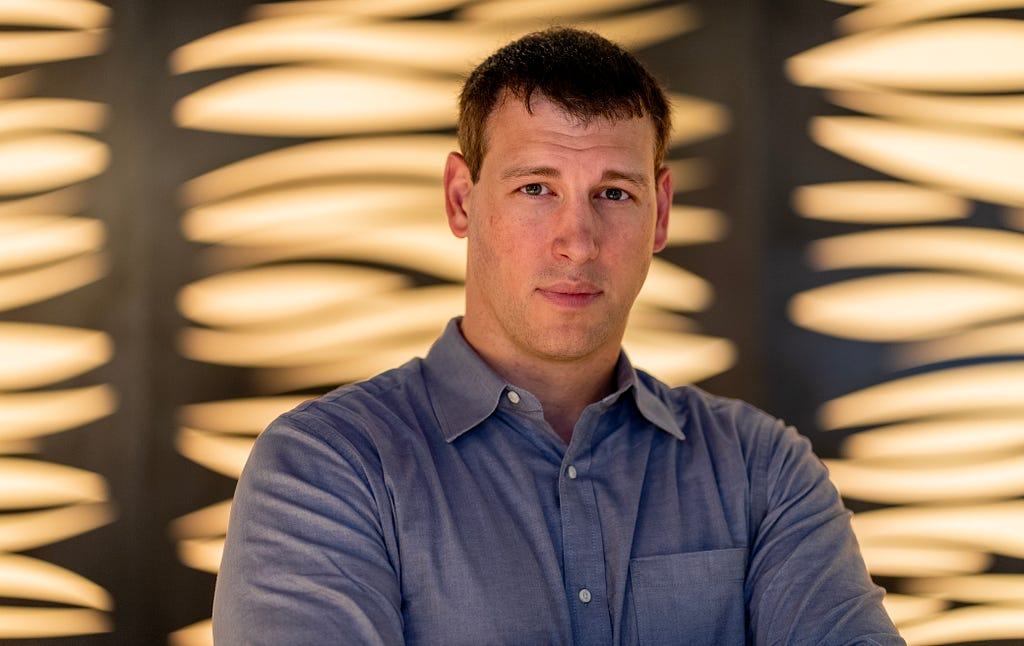An Interview With Vanessa Ogle
Trust your instincts. If you’re reading this, you have some sense that your own career in athletics will guide you well. Nothing that you read from others (like me) will be more important than the hard-fought lessons you’ve gained yourself.
The world of sports is not just about physical prowess or competition; it’s an incubator for leadership qualities such as discipline, teamwork, strategic planning, and resilience. Athletes, from amateur levels to professional arenas, often encounter situations that test their limits and require them to step up in ways that mirror the challenges faced by leaders in various fields. As part of this series, we had the pleasure of interviewing Shaun Clair.
Shaun Clair is the co-founder of Gray Wolf, a new breed of communications agency maximizing the potential of partnerships. Clair is an award-winning brand storyteller with more than twenty years experience. He’s one of the industry’s most trusted strategists with a recent legacy as a lead communicator to the world’s most culturally-connected brands, including Coca-Cola, the National Football League, Marriott International, Diageo, Major League Baseball, Topgolf, Under Armour, Callaway Golf and USAA.
Thank you so much for joining us in this interview series. Before we dive in, our readers would love to “get to know you” a bit better. Can you share with us the backstory about what brought you to your specific career in athletics?
My story begins in The Bronx at Fordham University, where I was a linebacker on the football team and a communications major. Entering college, I fashioned myself becoming a sports journalist but college athletics is so all-consuming that I watched my non-athlete peers advancing into journalism experience through internships at major media brands in New York City. I felt that I was falling behind.
My light bulb moment occurred when I took a class called “Sports Communication,” which introduced the world of public relations to me. This profession was a combination of passions and skills I possessed and wanted to grow further — writing, crafting stories, consuming and understanding forms of media. The specific niche I soon found was connecting brands to audiences through sports and entertainment.
My career would soon travel to some of the world’s best PR agencies and would take me to some of the world’s biggest sports and cultural events including The Emmys, SXSW, The NYC Marathon, The Daytona 500, MLB All-Star Game, Comic-Con International, NY Fashion Week and thirteen Super Bowls.
Can you share the most interesting story that happened to you since you started your career?
When I was 27 years old, I was working in New York when I took my first work trip out to Los Angeles. The client was Crown Royal and the great Jerry Rice was a spokesperson for the brand. My job was to line up media interviews on the red carpet at the ESPY Awards in support of a program we were running for the client. New York and LA are different cities but I was about to discover how different shortly after I landed at LAX.
I arrive at the Beverly Hills Four Seasons and take the elevator up to meet with Jerry in his suite. The elevator doors open and I recognize the most famous woman in the US at the time even though she was wearing a wig. Britney Spears had famously shaved her head just months before, but there she was — the first person to exit the elevator.
A short time later, I had to visit the lobby gift shop to get something that Jerry requested. Entering the gift shop, I immediately felt a hulking presence above me. It was Shaquille O’Neal, who was at the height of his fame as an active NBA player. Since then, I’ve worked with a number of famous people but the spontaneity of that day was unmatched.
Which three character traits do you think were most instrumental to your success? Can you please share a story or example for each?
This question is quite relevant as my co-founder and I wrote down the values that mattered most to us when we were creating Gray Wolf. We believed that being collaborative, egoless and thoughtful problem solvers were gifts we’d gotten from our careers in team sports.
We knew we thrived in team environments and that meant we could be competitive and still work well with a company’s other agencies and partners. That’s how we visualized our strength coming from our ability to run in a pack.
Yet, the key difference between being a good teammate and a good leader is knowing when to take direction and when to speak up.
Ok, thank you for that. Let’s now jump to the primary focus of our interview. Can you share a pivotal moment in your athletic career that taught you a leadership lesson you’ve applied outside of sports?
People will look at you closer during times of defeat. When morale is low, you need to imagine the future for your team. Here’s a story that illustrates that — my high school football team won the New York State Championship and then I started my career at Fordham playing for a winless team my freshmen season. This was shocking to everyone involved, including our head coach who had to instill belief when there were few proof points. He would promise to our freshman class, “you will win a league championship before you graduate.” (We did). We had no success to build on — we were winless — we could still imagine a better future.
How has your experience in team dynamics within athletics influenced your approach to leadership in the workplace?
Knowing that the team is talking about you and analyzing you. That’s what we did as teammates — we would actually talk about the coaches outside of practice, critiquing or praising their leadership skills and style. At work, you need to understand that the team is making assessments about you initially to see if you are serving them. Once you earn trust, then they will give you the benefit of the doubt.
In what ways has facing defeat or challenges in sports prepared you for handling failure and setbacks in your professional life?
The line between winning and losing is often thin. Athletes learn to analyze losses for lessons without losing sight of their goals, recognizing that both wins and losses contribute to improvement. Athletes understand that looking back at wins and losses isn’t about finger pointing or taking credit — it’s how teams get better.
How do you apply the discipline and training regimen from your athletic pursuits to your current leadership role?
As an athlete, you’re preparing for peak performance through training, sleep and diet. I’m looking at my weekly routine in the same way. I am paid to be creative, thoughtful, strategic and insightful throughout the day so I am still adopting an athlete’s mindset now. There is no way that you can perform at your best if you’re not taking care of your mind and your body through sleep, fitness and diet. It’s all about keeping yourself sharp.
Reflecting on your journey, what specific skills or attributes developed through athletics do you believe are most essential for effective leadership?
The most essential traits are to coach and to be coached. Athletes often have a direct way of speaking because we’ve been coached hard in our lives. As a leader, you must deliver feedback that is direct and actionable. Athletes understand the value of feedback in making someone better.

Based on your experience, can you please share “5 Ways That Athletics Can Help Train Great Leaders?”
1 . Trust your instincts. If you’re reading this, you have some sense that your own career in athletics will guide you well. Nothing that you read from others (like me) will be more important than the hard-fought lessons you’ve gained yourself.
2 . Serve the team. Leaders that believe that the team serves them are leaders in name only.
3 . Our minds and bodies play tricks on us. They tell us to slow down, not push ourselves too hard. As an athlete, you train your mind and body so you can overpower and conquer your inner voice (slow down, we’re tired!) rather than obey it. As an athlete, you know that you can always go further to get a job done.
4 . Leaders are judged on how they set their team up for success. The great coaches I played for weren’t always deeply charismatic, jovial or warm personalities. We loved playing for them because they set us up to win. And we loved and respected them for that.
5. Respect people’s time. Head coaches have every detail planned. Every minute of every practice is planned out. Road trips have a written agenda for when your team meetings, team breakfast occur — there is no moment when anyone can ask, “what are we doing?” It is all 100% planned and recorded. Saban, Auriemma and Belichick aren’t winging it.
You are a person of great influence. If you could start a movement that would bring the most amount of good to the most amount of people, what would that be? You never know what your idea can trigger. 🙂
Read biographies on the leaders you admire. You’ll understand them to be deeply committed, brilliant but often deeply flawed and certainly not universally loved. History reframes their story as mythology, but these were real people with real flaws and insecurities like all of us.
How can our readers further follow you online?
Visit us at GrayWolfAgency.com and I use LinkedIn to regularly share my thoughts on the sports, media and communications industries and lessons in leadership.
Thank you for the time you spent sharing these fantastic insights. We wish you only continued success in your great work!
Thanks, I appreciate you offering the platform.
About The Interviewer: Vanessa Ogle is a mom, entrepreneur, inventor, writer, and singer/songwriter. Vanessa’s talent in building world-class leadership teams focused on diversity, a culture of service, and innovation through inclusion allowed her to be one of the most acclaimed Latina CEO’s in the last 30 years. She collaborated with the world’s leading technology and content companies such as Netflix, Amazon, HBO, and Broadcom to bring innovative solutions to travelers and hotels around the world. Vanessa is the lead inventor on 120+ U.S. Patents. Accolades include: FAST 100, Entrepreneur 360 Best Companies, Inc. 500 and then another six times on the Inc. 5000. Vanessa was personally honored with Inc. 100 Female Founder’s Award, Ernst and Young’s Entrepreneur of the Year Award, and Enterprising Women of the Year among others. Vanessa now spends her time sharing stories to inspire and give hope through articles, speaking engagements and music. In her spare time she writes and plays music in the Amazon best selling new band HigherHill, teaches surfing clinics, trains dogs, and cheers on her children.
Please connect with Vanessa here on linkedin and subscribe to her newsletter Unplugged as well as follow her on Substack, Instagram, Facebook, and X and of course on her website VanessaOgle.
Shaun Clair Of Gray Wolf: How My Experience in Athletics Trained Me to Become a Better Leader was originally published in Authority Magazine on Medium, where people are continuing the conversation by highlighting and responding to this story.
